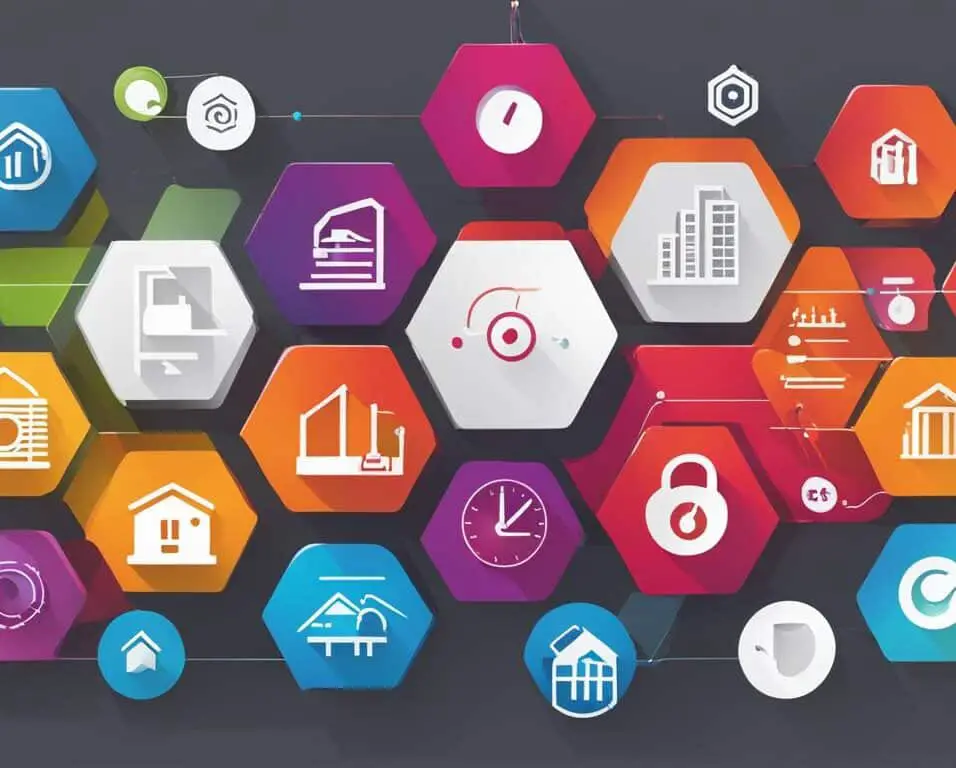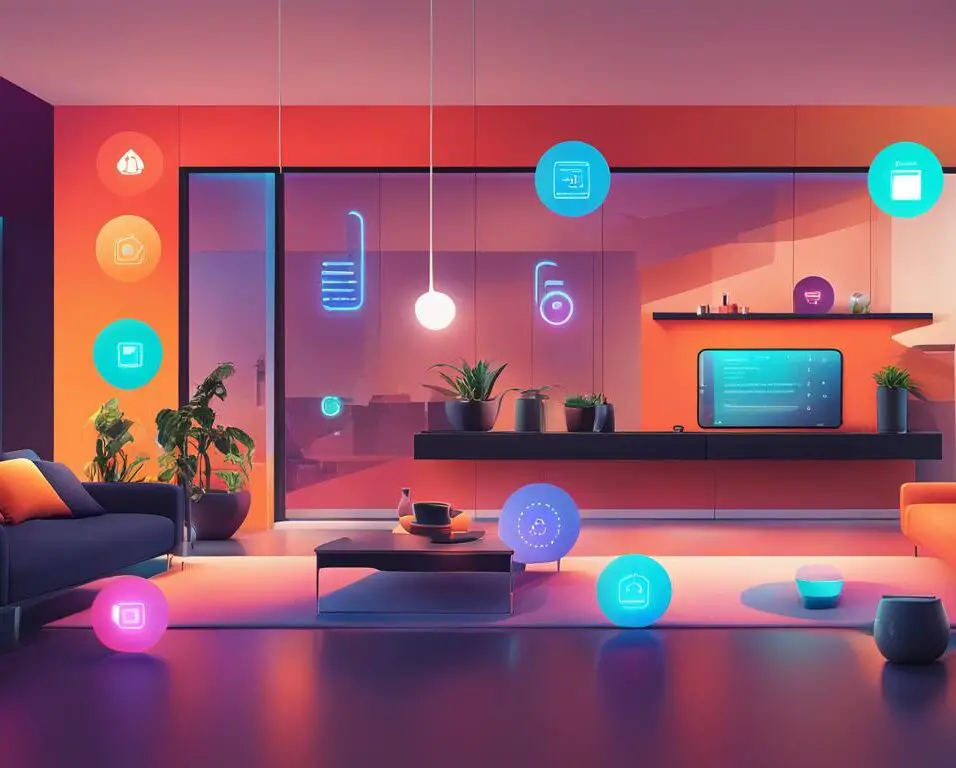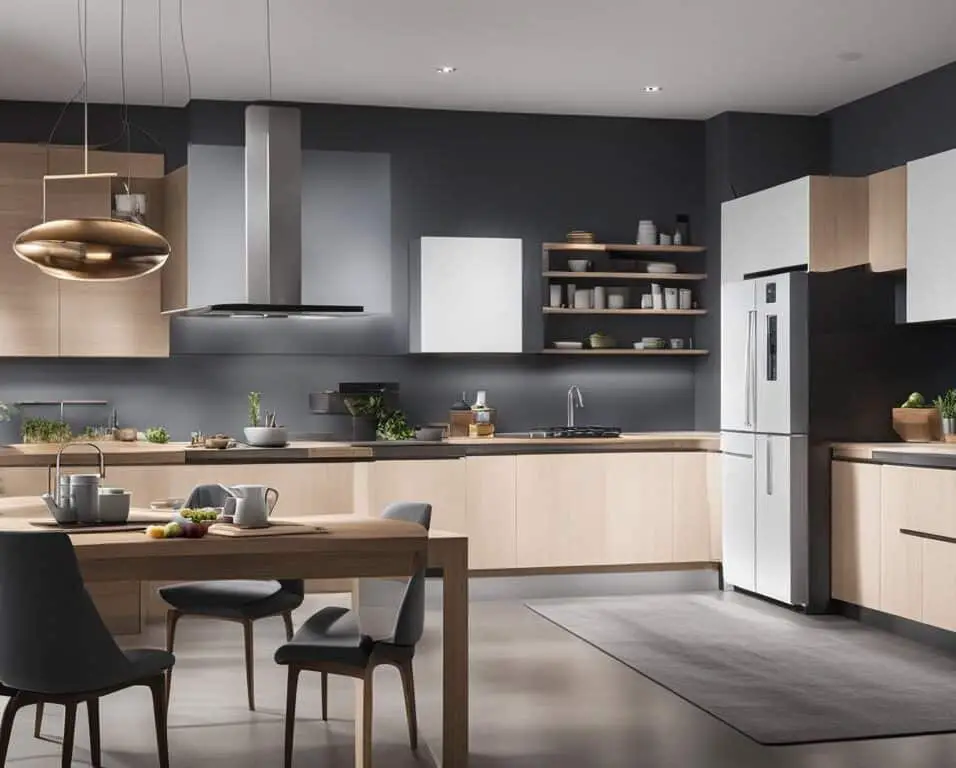AI-Powered Home Automation: A New Era
The fusion of Home Automation and Artificial Intelligence (AI) has ushered in a new era of smart living, transforming houses into intelligent, responsive, and intuitive living spaces. This article explores the powerful synergy between Home Automation and AI, highlighting how it is revolutionizing the concept of a Smart Home. From understanding AI-powered smart homes to the rise of voice-activated assistants, predictive home automation, AI in security, and energy efficiency, this article covers the various aspects of AI-powered home automation that are shaping the future of living spaces.
Key Takeaways:
- Smart Home Automation is being revolutionized by the integration of Artificial Intelligence (AI).
- AI algorithms in Smart Homes learn from user behavior to create personalized experiences.
- Voice-activated assistants like Amazon Alexa and Google Assistant simplify control of home automation devices.
- Predictive home automation adjusts settings based on data analysis, enhancing comfort and energy efficiency.
- AI-powered smart cameras improve home security with advanced features and proactive monitoring.
Understanding AI-Powered Smart Homes
In the realm of home automation, Artificial Intelligence (AI) has revolutionized the way our homes function. Through the integration of AI algorithms, smart homes have become intelligent and adaptable, capable of learning from user behavior, preferences, and patterns. This section delves into how AI-powered smart homes harness the power of AI algorithms to create living spaces that are not only responsive but also personalized to individual lifestyles.
AI algorithms play a vital role in understanding user behavior and anticipating their needs. By analyzing data collected from various sensors and devices, these algorithms grasp patterns and routines to automate tasks seamlessly. Whether it’s adjusting the temperature, lighting, or even playing music, AI-powered smart homes intuitively respond to the unique preferences and habits of their occupants.
“The integration of AI algorithms in smart homes allows for a level of automation previously unimaginable. By understanding and adapting to user behavior, these homes create an environment that aligns perfectly with individual needs and preferences.”
Automation routines driven by AI algorithms enable homeowners to effortlessly carry out daily tasks. For instance, the smart home can learn when you typically arrive home from work and automatically adjust the thermostat, ensuring optimal comfort upon your arrival. By observing and predicting user behavior, AI-powered smart homes streamline routines and elevate the overall living experience.
Personalized Experiences Tailored to Individual Lifestyles
One of the remarkable aspects of AI-powered smart homes is their ability to deliver personalized experiences. AI algorithms analyze user data to determine individual preferences and tailor settings accordingly. Whether it’s adjusting the lighting to create a cozy ambiance for relaxation or preparing the perfect cup of coffee in the morning, AI-powered smart homes cater to the unique needs and desires of each resident.
Ultimately, AI-powered smart homes create a harmonious environment by seamlessly integrating technology and user behavior. Through the use of AI algorithms, these homes anticipate needs, automate routines, and deliver personalized experiences, making everyday life more convenient and enjoyable.
The Rise of Voice-Activated Assistants
Voice-activated virtual assistants have quickly become indispensable tools in the world of smart homes. With the likes of Amazon Alexa, Google Assistant, and Apple’s Siri, controlling your home automation devices has never been easier. Simply by using your voice, you can effortlessly interact with your smart home and accomplish a myriad of tasks.
The Convenience of Voice Control
These voice-activated virtual assistants have revolutionized the way we interact with our smart homes. No longer do we need to fiddle with buttons or navigate through complex menus to control our devices. Instead, a simple voice command is all it takes to make things happen.
Whether you want to turn on the lights, adjust the thermostat, or play your favorite music, just say the word and your virtual assistant will carry out your request. Gone are the days of searching for remotes or reaching for your phone; now, all it takes is a few spoken words.
Seamless Integration with Smart Home Devices
One of the key advantages of voice-activated virtual assistants is their ability to integrate seamlessly with a wide range of smart home devices. Whether you have smart lights, smart thermostats, or smart speakers, these virtual assistants can connect and control them all.
Through voice commands, you can create custom routines and automations, allowing you to effortlessly control multiple devices with a single phrase. For example, by saying “Goodnight,” your virtual assistant can turn off the lights, lower the thermostat, and lock the doors, creating a cozy and secure environment for bedtime.
Expanding Capabilities and Skills
As technology continues to advance, voice-activated virtual assistants are continuously learning new skills and expanding their capabilities. From answering trivia questions to helping with recipe suggestions, these virtual assistants are becoming virtual companions that can assist with a wide array of tasks.
Furthermore, voice-activated assistants are constantly integrating with new smart home devices and services, ensuring compatibility and enhancing their usefulness. Whether it’s scheduling appointments, setting reminders, or ordering groceries, these assistants are becoming an integral part of our daily lives.
Evolving User Experience
The rise of voice-activated virtual assistants has transformed the user experience of smart homes. With their natural language processing capabilities, these assistants provide a more intuitive and human-like interaction. They understand context, follow conversations, and adapt to individual preferences, making the control of your smart home feel effortless and personalized.
Through the use of artificial intelligence and machine learning, these virtual assistants continually improve and refine their abilities to serve you better. As they gather data on your usage patterns and preferences, they become even more adept at anticipating your needs and delivering a seamless smart home experience.

The Future of Hands-Free Control
Voice-activated virtual assistants are here to stay, and they are shaping the future of smart homes. As technology continues to evolve, we can expect these assistants to become even more integrated and connected with our daily lives.
Imagine a future where simply speaking to your virtual assistant can adjust the lighting, unlock doors, start the coffee maker, and even order groceries. With voice-activated assistants, the possibilities are endless, and the convenience of a truly hands-free smart home is within reach.
Predictive Home Automation: The Home of Tomorrow, Today
The fusion of Home Automation and AI has paved the way for predictive home automation. With the ability to analyze data and predict outcomes, smart homes can now proactively adjust settings to optimize comfort, energy efficiency, and convenience. Through a combination of weather forecasts, energy usage patterns, and occupant habits, homes equipped with predictive automation provide an intuitive and streamlined living experience. In this section, we will explore the numerous benefits of predictive home automation and its transformative impact on the management of smart homes.
Enhancing Comfort and Energy Efficiency
One of the key advantages of predictive home automation is its ability to enhance comfort and energy efficiency. By leveraging AI algorithms and data analysis, smart homes can anticipate occupants’ needs and preferences. For example, based on weather forecasts, the automation system can adjust the indoor temperature and lighting levels, ensuring optimal comfort without any manual intervention. Moreover, predictive automation can intelligently manage energy consumption by identifying usage patterns and optimizing settings accordingly, resulting in reduced energy waste and lower utility bills.
Imagine arriving home after a long day at work, and your smart home has already adjusted the temperature, opened the blinds, and turned on your favorite relaxing music, all based on your historical preferences and daily routines. With predictive home automation, this level of personalized comfort and convenience becomes a reality.
Proactive Adjustment for Optimal Performance
Predictive home automation goes beyond reacting to user commands; it proactively adjusts settings to ensure optimal performance and seamless integration between devices and systems. For example, when it detects that you’re about to enter a room, the automation system can activate the lights and adjust the ambiance according to your preferences. Similarly, it can optimize energy usage by automatically adjusting thermostat settings based on occupancy patterns, thereby reducing energy waste and enhancing efficiency.
By tuning into user behavior and preferences, predictive home automation creates an environment that adapts to your needs seamlessly. It eliminates the need for constant manual adjustments, making your home more intuitive and responsive to your lifestyle.
Effortless Management of Smart Homes
With predictive home automation, the management of smart homes becomes effortless. The automation system takes charge of routine tasks, such as adjusting temperature settings based on weather forecasts or optimizing energy usage during peak hours. This frees up time and energy for homeowners to focus on other priorities, ultimately simplifying their daily lives.
Furthermore, predictive home automation enables remote control and monitoring of smart home devices. Whether you’re at work, on vacation, or simply in another room, you can effortlessly manage and monitor your home through a mobile app or voice-activated virtual assistant. This level of control and convenience provides homeowners with peace of mind and the flexibility to manage their homes from anywhere, at any time.

By leveraging the power of AI and predictive algorithms, home automation systems are revolutionizing the way we live. Predictive home automation not only enhances comfort and energy efficiency but also simplifies the management and control of smart homes. As we continue to embrace innovation, the home of tomorrow is already here today.
AI in Security: Beyond Traditional Surveillance
AI-powered smart cameras are revolutionizing home security by going beyond traditional surveillance methods. These advanced cameras utilize artificial intelligence to distinguish between humans, animals, and objects, ensuring a higher level of accuracy and efficiency in monitoring activities within and around the house. In addition to their exceptional recognition capabilities, AI-powered smart cameras can also detect suspicious behavior, providing homeowners with a proactive security solution.
“With AI-powered smart cameras, homeowners can have peace of mind knowing that their property is under constant watch. These cameras not only capture high-quality video footage but also analyze it in real-time, alerting users to any unusual activity or potential security threats. This proactive approach to security allows for prompt action and serves as a deterrent to potential intruders.”
By utilizing AI algorithms, smart cameras can quickly identify and analyze suspicious behavior, such as loitering, trespassing, or unauthorized access. This level of intelligence enables homeowners to take immediate action, whether it’s contacting law enforcement or activating automated security responses, such as turning on outdoor lights, sounding alarms, or locking doors.
In addition to real-time alerts, AI-powered smart cameras offer remote monitoring capabilities, allowing homeowners to keep a close eye on their property even when they’re away. With the ability to access live video feeds and recorded footage from their smartphones or other devices, homeowners can stay connected and maintain control over their home’s security from anywhere in the world.
Benefit overview of AI-powered smart cameras:
- Accurate recognition of humans, animals, and objects
- Detection of suspicious behavior and potential security threats
- Real-time alerts for immediate action
- Automated security responses for proactive defense
- Remote monitoring capabilities for enhanced control
With AI in security, homeowners can enjoy proactive surveillance and a greater sense of security. The integration of AI-powered smart cameras elevates traditional home security systems to a more advanced and effective level, providing peace of mind and ensuring the safety of both property and occupants.
| Feature | Description |
|---|---|
| AI Recognition | Accurately identifies humans, animals, and objects for enhanced monitoring. |
| Suspicious Behavior Detection | Utilizes AI algorithms to detect and analyze suspicious activity. |
| Real-time Alerts | Notifies homeowners immediately of any unusual or potentially harmful events. |
| Automated Security Responses | Activates predefined security measures, such as lights or alarms, in response to security breaches. |
| Remote Monitoring | Enables homeowners to monitor their property from anywhere via smartphones or other devices. |
AI and Energy Efficiency: Smartly Saving Resources
AI-driven energy management systems play a pivotal role in creating eco-friendly and cost-efficient homes. Leveraging the power of artificial intelligence, these systems optimize heating and cooling, as well as manage electricity consumption, reducing environmental impact and helping homeowners save on energy bills.
AI-driven energy management brings a new level of intelligence to smart homes, enabling them to adapt and optimize energy usage based on various factors such as occupancy, weather conditions, and user preferences. By constantly analyzing data and making real-time adjustments, AI systems ensure that energy is utilized efficiently, significantly reducing waste and unnecessary consumption.
One of the key advantages of AI-driven energy management is its ability to optimize heating and cooling systems. By analyzing factors like climate, occupancy, and temperature patterns, AI algorithms can adjust thermostats and HVAC systems in real-time, maintaining a comfortable living environment while minimizing energy usage. This proactive approach not only enhances energy efficiency but also promotes a sustainable and eco-friendly lifestyle.
AI-driven Energy Management in Action: The Benefits
Let’s take a deeper look at the benefits of AI-driven energy management:
- Reduced Environmental Impact: By intelligently monitoring and controlling energy consumption, AI systems help to reduce carbon emissions and mitigate environmental damage.
- Cost Savings on Energy Bills: AI-driven energy management optimizes energy usage, resulting in significant cost savings on utility bills over time.
- Optimized Heating and Cooling: The intelligent analysis of climate, weather conditions, and occupancy patterns enables AI systems to optimize heating and cooling, ensuring comfort while conserving energy.
- Personalized Energy Solutions: AI algorithms learn from household energy usage patterns and create personalized energy-saving plans, maximizing efficiency based on individual preferences.
- Real-time Energy Monitoring: AI-enabled energy management systems provide real-time insights into energy usage, empowering homeowners to make informed decisions and take actions to reduce consumption.
With AI-driven energy management, homeowners can effortlessly create an eco-friendly and cost-efficient living space, contributing to a sustainable future while enjoying the benefits of optimized energy usage. By integrating AI technology into smart homes, we can save resources, reduce energy waste, and make a positive impact on both the environment and our wallets.
“AI-driven energy management is the key to achieving a sustainable future and creating homes that are both environmentally conscious and cost-effective.”
| Benefits of AI-driven Energy Management | Details |
|---|---|
| Reduced Environmental Impact | AI systems intelligently monitor and control energy consumption, minimizing carbon emissions and environmental damage. |
| Cost Savings on Energy Bills | By optimizing energy usage, AI-driven systems result in significant cost savings on utility bills over time. |
| Optimized Heating and Cooling | AI algorithms analyze climate, weather conditions, and occupancy patterns to optimize heating and cooling, ensuring comfort while conserving energy. |
| Personalized Energy Solutions | AI systems create personalized energy-saving plans based on household usage patterns and individual preferences. |
| Real-time Energy Monitoring | AI-enabled systems provide real-time insights into energy usage, empowering homeowners to make informed decisions and reduce consumption. |
By harnessing the power of AI-driven energy management, homeowners can make a positive impact on the environment while enjoying the benefits of lower energy costs and enhanced comfort. Embracing eco-friendly and cost-efficient solutions today will pave the way for a sustainable and energy-efficient future.
Conclusion
The fusion of Smart Home Automation and AI technology has revolutionized the concept of living spaces, transforming houses into intelligent, efficient, and responsive homes. With the rise of voice-activated assistants, predictive automation, and AI-driven energy management systems, the possibilities for the future of smart homes are endless.
The seamless integration of AI technology in smart homes has made daily tasks effortless. Voice-activated assistants like Amazon Alexa, Google Assistant, and Apple Siri have simplified control over home automation devices, offering a convenient and intuitive user experience.
Predictive automation takes smart homes to a whole new level by proactively adjusting settings based on weather forecasts, energy usage patterns, and user preferences. This not only enhances comfort but also promotes energy efficiency, helping homeowners save on energy bills while reducing their environmental impact.
The incorporation of AI in home security systems has transformed surveillance from reactive to proactive. AI-powered smart cameras can detect suspicious behavior, send real-time alerts, and even automate responses to security breaches, enhancing the safety and peace of mind of homeowners.
As AI technology continues to evolve, we can expect the future of living spaces to be a harmonious blend of human needs and AI ingenuity. Smart homes will become even more captivating and practical, offering intelligent, efficient, and responsive living environments for the modern homeowner.
FAQ
What is AI-Powered Home Automation?
AI-Powered Home Automation is the fusion of Home Automation and Artificial Intelligence (AI) technologies. It involves using AI algorithms to create intelligent and responsive living spaces by learning from user behavior, automating routines, and delivering personalized experiences.
How do voice-activated assistants work in smart homes?
Voice-activated assistants, such as Amazon Alexa, Google Assistant, and Apple Siri, simplify interaction with home automation devices by enabling voice control. Users can perform various tasks by simply giving voice commands, making smart home control effortless and convenient.
What is predictive home automation?
Predictive home automation is a technology that uses AI to analyze data and predict outcomes. AI algorithms proactively adjust settings based on weather forecasts, energy usage patterns, and occupants’ habits, enhancing comfort and energy efficiency in smart homes.
How does AI improve home security?
AI-powered smart cameras can distinguish between humans, animals, and objects, and even detect suspicious behavior. This proactive security feature offers real-time alerts, automated responses to security breaches, and remote monitoring capabilities.
How does AI enhance energy efficiency in smart homes?
AI-driven energy management systems optimize heating and cooling, as well as manage electricity consumption in smart homes. This technology minimizes environmental impact and helps homeowners save on energy bills.








